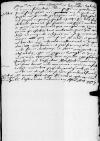Letter #1619
[Ioannes DANTISCUS] to UNKNOWNLöbau (Lubawa), 1537-04-07
English register: Dantiscus apologizes to the addressee that he cannot send the horses requested for the latter’s journey, but he has none that are good enough. For his own journey to Cracow, he borrowed horses from the Warmia bishop (Maurycy Ferber). He sent the majordomo to Kashubia to get horses, but the man did not manage to buy any.
Manuscript sources:
Prints:
| ||||||
Text & apparatus & commentary Plain text Text & commentary Text & apparatus Excerpts concerning Dantiscus' travels
Magnifice Domine, Amice carissime et honorande. Salutem et omnem felicitatem.
Non possum non quodammodo pudefieri, quod postulatis Magnificentiae Vestrae, cui in quibus possum non gravate gratificari velim, satisfacere ad praesens nequeam, quandoquidem equorum, qui boni dici deberent, penuriam ipse patior. Acceperam in mutuum a
Ex
[1 ] Dantiscus was at the Diet in Cracow from December 1536 to February 1537
